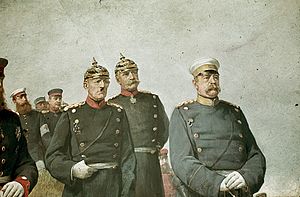
Back سياسة عسكرية Arabic Militarismu AST Militarizm Azerbaijani Мілітарызм Byelorussian Мілітарызм BE-X-OLD Милитаризъм Bulgarian Militarisme Catalan سەربازیخوازی CKB Militarismus Czech Militariaeth Welsh

| Part of a series on |
| War |
|---|
 |
Militarism is the belief or the desire of a government or a people that a state should maintain a strong military capability and to use it aggressively to expand national interests and/or values.[1] It may also imply the glorification of the military and of the ideals of a professional military class and the "predominance of the armed forces in the administration or policy of the state"[2] (see also: stratocracy and military junta).
Militarism has been a significant element of the imperialist or expansionist ideologies of many nations throughout history. Notable ancient examples include the Assyrian Empire, the Greek city state of Sparta, the Roman Empire, the Aztec nation, and the Mongol Empire. Examples from modern times include the Ottoman Empire, the Kingdom of Prussia/German Empire/Third Reich, the British Empire, the Habsburg monarchy, the United States of America, the First French Empire, the Zulu Kingdom, the Empire of Japan, the Italian Empire under Benito Mussolini, Israel, North Korea and the Russian Empire/Soviet Union/Russia.
- ^ New Oxford American Dictionary (2007)
- ^ "Militaristic - definition of militaristic by The Free Dictionary". TheFreeDictionary.com.
© MMXXIII Rich X Search. We shall prevail. All rights reserved. Rich X Search